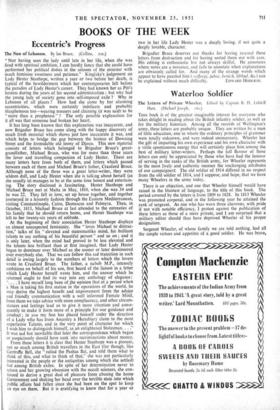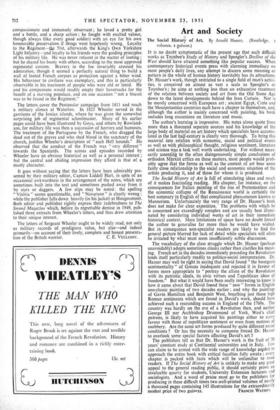Waterloo Soldier
THIS book is of the greatest imaginable interest for everyone who takes delight in reading about the British infantry soldier, as well as for the military historian. Among all the records of Wellington's army, these letters are probably unique. They are written by a man of little education, one to whom the ordinary principles of grammar were totally unknown, and were indeed unnecessary. Wheeler has the gift of imparting. his own experience and his own character with a virile spontaneous energy that will certainly place him among the best of military letter-writers. Perhaps the full flavour of these letters can only be appreciated by those who have had the honour of serving in the ranks of the British army, for Wheeler represents in the most lively and authentic manner the unchanging attributes of our campaigners. The old soldier of 1914 differed in no respect from the old soldier of 1814, and I suppose, and hope, that we have many Wheelers in the army today.
There is an objection, and one that Wheeler himself would have raised in the bluntest of language, to the title of this book. The period covered by the letters is from 1809 to 1828. In 1813 Wheeler was promoted corporal, and in the following year he attained the rank of sergeant. As one who has worn three chevrons, with pride if not with notable efficiency, I protest against the publication of these letters as those of a mere private, and I am surprised that a military editor should thus have deprived Wheeler of his proper designation.
Sergeant Wheeler, of whose family we are told nothing, had all the simple virtues and appetites of a good soldier. He was brave, compassionate and immensely observant ; he loved a pretty girl and a bottle, and a sharp action ; he fought with exalted valour, though always (like every good soldier) with an eye for his own honourable preservation if things went hopelessly wrong. Loyalty to the Regiment—We 51st, afterwards the King's Own Yorkshire Light Infantry—and loyalty to his friends were the guiding principles of his military life. He was never reticent in the matter of looting ; but he shared his booty with others, according to the most approved regimental custom. Bravery in the foe invariably aroused his admiration, though it seemed a perfectly natural thing to build a wall of looted French corpses as protection against a bitter wind. His behaviour to civilians was exemplary, and this is particularly observable in his treatment of people who were old or timid. He and his companions would readily empty their haversacks for the benefit of a starving populace, and on one occasion " not a biscuit was to be found in the Regiment."
The letters cover the Peninsular campaign from 1811 and reach a military climax at Waterloo. In 1823 Wheeler served in the garrisons of the Ionian islands, where he was given the somewhat surprising job of regimental schoolmaster. Many of his earlier pages could have been illustrated by Goya, and others by Rowland- son, for military life was then a succession of horrors and humours. The treatment of the Portuguese by the French, who dragged the dead out of the graves and who shed blood in the sanctuary of the church, justifies Wheeler's description of " such Hell hounds." He observed that the conduct of the French was " very different " towards the Spaniards. The scenes and episodes recorded by Wheeler have an obvious historical as well as a personal interest ; but the central and abiding impression they afford is that of a manly character.
It goes without saying that the letters have been admirably pre- sented by their military editor, Captain Liddell Hart, in spite of an occasional awkwardness in the arrangement of the notes, which are sometimes built into the text and sometimes pushed away from it by stars or daggers. A few slips may be noted: the spelling " Vitoria " seems questionable, and " Navaruno " is clearly wrong ; while-the publisher falls down heavily (in his jacket) at Hougoumont. Both editor and publisher rightly express their indebtedness to The Strand Magazine which, before its regrettable demise in 1949, pub- lished three extracts from Wheeler's letters, and thus drew attention to their unique interest.
The letters of Sergeant Wheeler ought to be widely read, not only as military records of prodigious value, but also—and indeed primarily—on account of their lively, complete and honest presenta-



































 Previous page
Previous page